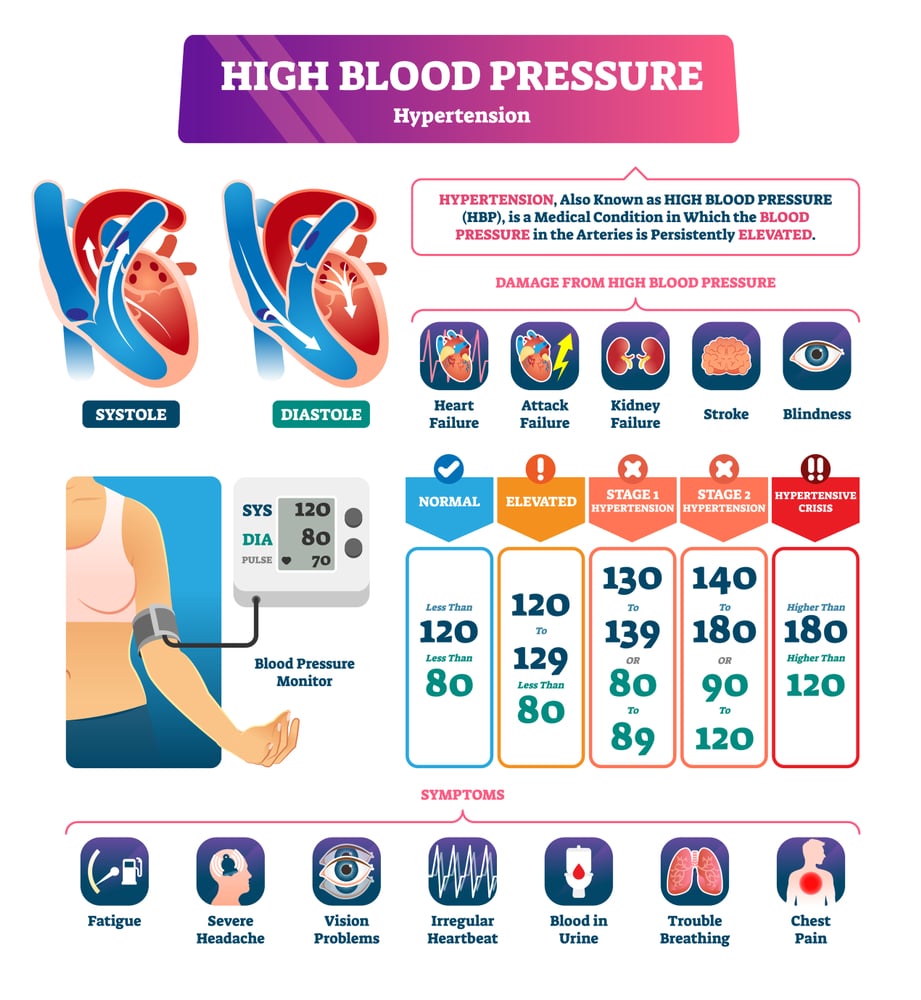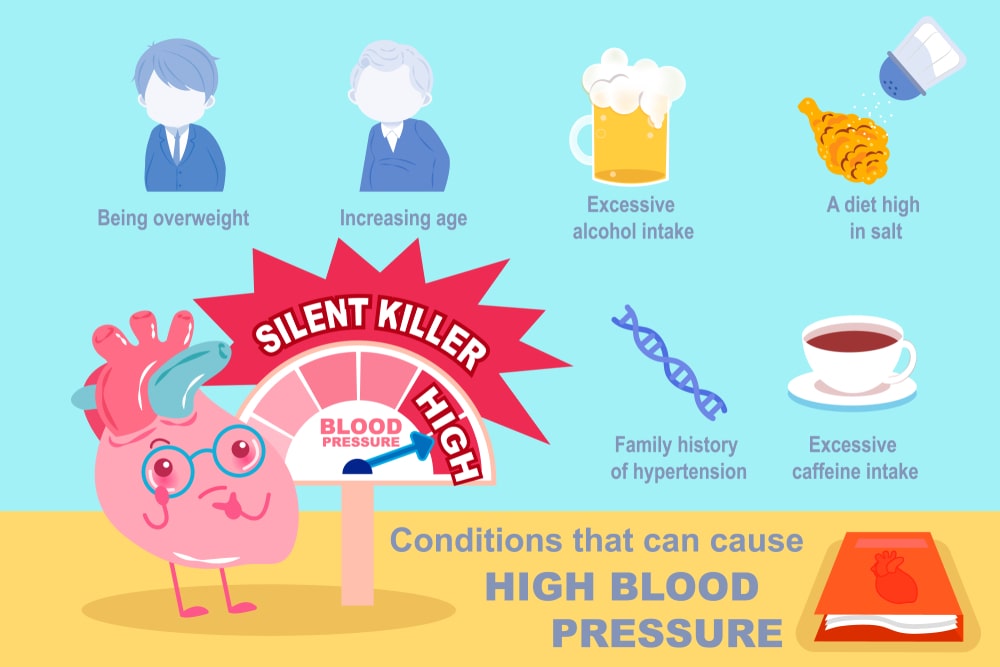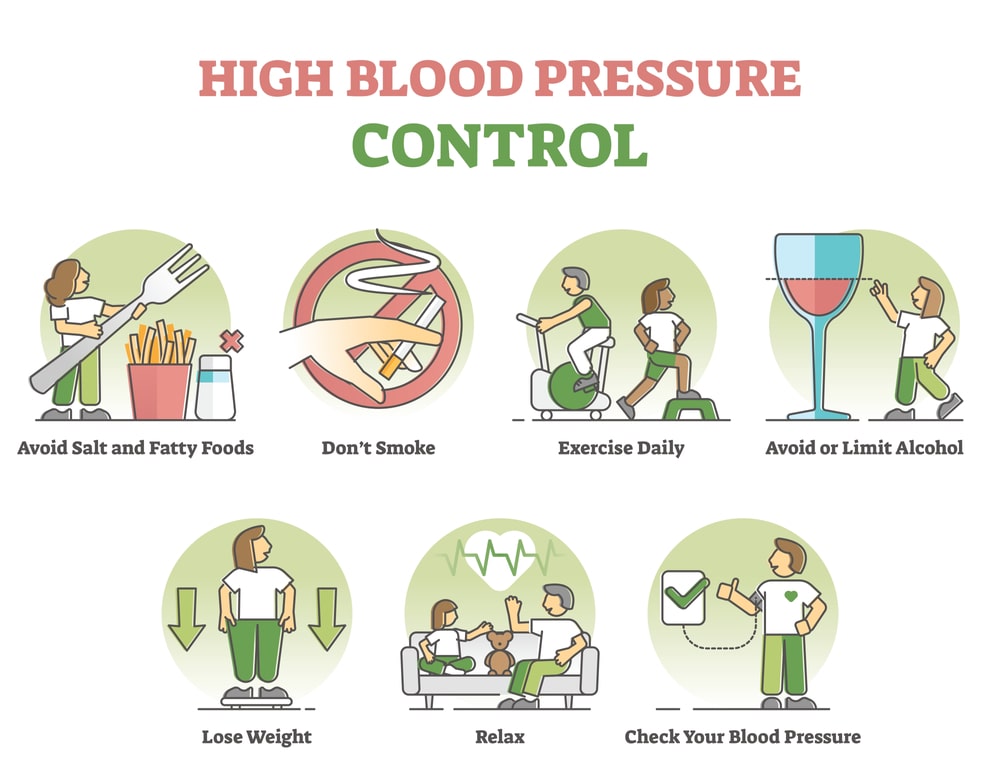Why Is Hypertension Known As The Silent Killer?
Hypertension, also known as high blood pressure, is one of the most common lifestyle diseases and has grown largely nowadays. There is a lot of ongoing research and debate on why is hypertension known as the silent killer. In this blog, we have tried an attempt to precisely answer and understand the causes, risk factors, dangers, and prevention of hypertension.
What is hypertension?

To explore why is hypertension known as the silent killer we need to begin with what is hypertension. Hypertension is a medical condition defined by high blood pressure in the arteries. The force that the blood applies to the artery walls while the heart pumps blood throughout the body is known as blood pressure.
Over time, persistently high blood pressure can put stress on the arteries and other organs, raising the risk of major health issues like heart disease, stroke, kidney disease, and eyesight loss.
The two figures in a blood pressure reading are the diastolic and systolic pressures. Diastolic pressure shows the force experienced by the heart as it relaxes in between beats.
In contrast, systolic pressure measures the force applied to the arterial walls during cardiac contraction and blood pumping. When blood pressure continuously registers at 130/80 mmHg or greater, hypertension is diagnosed.
Depending on its severity, hypertension can be divided into several stages:
- Stage 1 Hypertension: Diastolic pressure of 80–89 mmHg or a systolic pressure of 130–139 mmHg.
- Stage 2 Hypertension: Diastolic pressure of 90 mmHg or greater, or a systolic pressure of 140 mmHg or higher.
What causes hypertension?

To get an insight into why is hypertension known as the silent killer we need to understand how it is being caused. Hypertension can have several reasons, and multiple variables often work together to cause it to develop. Effective therapy and prevention of hypertension require an understanding of its underlying causes.
The following are some typical causes and contributing risk factors:
- Genetics and Family History: High blood pressure can run in families. If either or both of your parents have high blood pressure, you may be more likely to get it yourself.
- Unhealthy Lifestyle Choices: Eating a diet deficient in potassium and heavy in cholesterol, saturated fats, and sodium (salt) can exacerbate hypertension. Fast meals, processed foods, and consuming too much salty food can all raise blood pressure.
- Lack of Physical Activity: A higher risk of hypertension is associated with sedentary lives with little physical activity.
- Obesity: Carrying excess weight or being fat causes the heart to work harder and raise blood pressure.
- Age: As blood vessels become less elastic and arterial stiffness develops, blood pressure tends to rise with age.
- Stress: Prolonged or chronic stress can increase the body’s production of stress hormones like cortisol, which can elevate blood pressure and cause hypertension.
- Smoking and Tobacco Use: These behaviors can cause short-term hypertension by damaging blood vessels and raising blood pressure, as well as long-term hypertension. High blood pressure can also result from exposure to secondhand smoke.
- Overindulgence in Alcohol: Consuming alcohol in excess can eventually cause blood pressure to rise.
- Chronic Conditions: The body’s capacity to control blood pressure might be hampered by kidney-related conditions, hormonal imbalances, and endocrine disorders.
- Sleep Apnea: Because of the frequent decreases in blood oxygen levels and elevated sympathetic activity, obstructive sleep apnea, a sleep disease marked by disrupted breathing during sleep, is also linked to hypertension.
- Medication: Blood pressure elevation is a side effect of some medications, such as decongestants, oral contraceptives, corticosteroids, nonsteroidal anti-inflammatory drugs (NSAIDs), and some antidepressants.
How is hypertension diagnosed?

Once we get to know about hypertension and how it is being caused, the next very obvious concern arises how is hypertension diagnosed? A combination of blood pressure readings and medical evaluation is usually used to diagnose hypertension or excessive blood pressure.
How to Measure Blood Pressure?
A sphygmomanometer, a blood pressure monitor, is used by medical professionals to take blood pressure readings. Two numbers are used to record blood pressure: over the diastolic pressure in the systolic pressure.
The unit of measurement for blood pressure is millimeters of mercury (mmHg). For instance, a blood pressure result of 120/80 mmHg signifies a 120 mmHg systolic and an 80 mmHg diastolic pressure.
Usually, blood pressure readings are obtained while the subject is comfortably seated with their arm resting at heart level. To assure accuracy, it is possible to collect multiple measurements at different times.
When blood pressure readings are consistently elevated on two or more distinct occasions, a diagnosis of hypertension is usually confirmed. Following a diagnosis of hypertension, a medical professional could carry out additional assessments to find any underlying causes or aggravating variables.
A thorough medical history, physical examination, laboratory testing (such as urinalysis and blood tests), and an evaluation of lifestyle factors (such as physical activity, food, and smoking habits) may all be part of this.
Why is hypertension known as the silent killer?

When people ask Why is hypertension known as the silent killer the simple answer is due to its insidious nature of causing significant harm to the body without manifesting noticeable symptoms in many cases.
The following explains Why is hypertension known as the silent killer:
- Absence of Symptoms: Frequently, hypertension occurs gradually over time without exhibiting any overt symptoms. This implies that people may have excessive blood pressure and not even realize it for years, silently causing harm to vital organs.
- Underlying Damage: Hypertension continuously strains the heart, blood vessels, and other organs, even though it may not show any symptoms. This strain has the potential to cause harm over time and raise the risk of major health issues like heart disease, stroke, kidney disease, and eyesight loss.
- Delay in Diagnosis: Since hypertension is frequently asymptomatic, people may wait to seek treatment until problems manifest. When signs of issues show up, irrevocable damage has already happened. This delay in diagnosis and treatment contributes to the silent but deadly nature of hypertension.
- False sense of Safety: When symptoms are absent, people may get a false sense of security and think they are well even when their blood pressure is elevated. If blood pressure is not regularly checked, hypertension may go undiagnosed and go on its insidious attack on cardiovascular health.
- Increasing rate of prevalence: Millions of individuals of all ages worldwide suffer from hypertension, which is a widespread condition. Its reputation as a silent killer stems from its common occurrence due to changing sedentary lifestyles and silent progression—many people may be unknowingly suffering from untreated high blood pressure.
How to relieve hypertension?

Once we get deeper into why is hypertension known as the silent killer the following concern is how to prevent or relieve hypertension.
The following are some effective steps for lowering blood pressure:
- Healthy and Nutritious diet: Eat a diet high in fruits, vegetables, whole grains, lean meats, and dairy products with low-fat content. Dietary Approaches to Stop Hypertension recommends eating a diet high in fiber, potassium, and magnesium and minimizing salt intake. Eat fewer processed foods, fast food, sugar-filled drinks, and foods heavy in trans and saturated fats.
- Regular Exercise: Do at least 150 minutes of aerobic exercise per week, or as directed by your healthcare professional, such as running, cycling, dancing, swimming, or brisk walking. Include at least two days each week of strength training activities that focus on your primary muscle groups.
- Keep an eye on Weight: A healthy weight can be attained and maintained by combining dietary adjustments with frequent exercise. Blood pressure can be significantly lowered with as little as 5–10% of body weight lost.
- Limit Consumption of Alcohol: If you use alcohol at all, do it in moderation. For ladies, limit intake to one drink per day; for men, limit to two drinks per day.
- Give Up Smoking: Give up smoking if you do. In addition to increasing the risk of heart disease and other health issues, smoking can elevate blood pressure.
- Reduce stress: Engage in stress-relieving activities like progressive muscle relaxation, yoga, tai chi, meditation, deep breathing, and time in nature. Make self-care a priority and partake in enjoyable and calming hobbies or pastimes.
- Track your blood pressure: Make sure your blood pressure readings stay within the desired ranges by regularly monitoring them.
- Medications: In case lifestyle modifications prove inadequate in reducing blood pressure, your physician might recommend medication as a means of managing hypertension. Some of the commonly prescribed medications are ACE inhibitors (Lisinopril, Ramipril), calcium channel blockers (Amlodipine), angiotensin II receptor blockers (Losartan, Valsartan), thiazide diuretics (Hydrochlorothiazide), beta-blockers (Atenolol), etc.
Takeaway:
In conclusion, hypertension is known as a silent killer because it can silently destroy the body’s internal organs without producing any signs. This can result in a delayed diagnosis, a higher chance of complications, and even fatal outcomes. Raising awareness, monitoring blood pressure regularly, and acting quickly are essential in the fight against this quiet but fatal illness.
FAQs:
Can hypertension cause dehydration?
Hypertension does not directly lead to dehydration. However, some drugs used to treat hypertension, such as diuretics, can cause an increase in the output of urine, which can have the unintended side effect of dehydration and cause fluid loss.
Is hypertension a cardiovascular disease?
Hypertension is not usually considered a cardiovascular disease itself but it is a major risk factor for several cardiovascular diseases (CVDs). These comprise peripheral arterial disease, heart failure, stroke, and coronary artery disease. Because it can cause damage and narrowing of the blood vessels over time, raising the likelihood of consequences including heart attacks, strokes, and heart failure.
Can hypertension be reversed?
Hypertension is frequently efficiently controlled and managed with dietary changes and medication. These therapies can frequently lower blood pressure to normal ranges and reduce the chance of consequences from hypertension. However hypertension may not be fully “reversed” to a permanently normal state; one can lower their risk of consequences related to high blood pressure, such as heart disease, stroke, and kidney damage, with the right lifestyle modifications and medical care.
What food is good for hypertension?
Maintaining a nutritious diet is essential for controlling hypertension, or high blood pressure. To minimize sodium, saturated fats, and added sugars, the Dietary Approaches to Stop Hypertension (DASH) diet frequently suggests whole grains, fruits, vegetables, lean proteins, and low-fat dairy products and minimizes salt intake.
Is hypertension hereditary?
The likelihood of having Hypertension in an individual is largely influenced by their family history. You could be more likely to acquire high blood pressure if either or both of your parents do. Genetics and other daily lifestyle variables such as food, amount of physical exercise, stress, smoking, and alcohol intake are also other silent contributing factors that majorly account for why is hypertension known as the silent killer.

